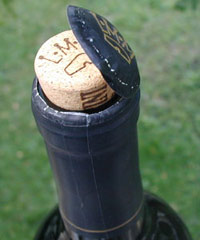Today's Sponsor• A message from WineLibrary.com In This Issue• "Cooking" wine - an experiment |
Cooking wine - an experiment
 |
Is your wine ruined? Today we return to the Wine Advisor archives for a look at this seasonal question.
The conventional wisdom says so. Every wine expert will tell you that even brief exposure to extreme heat will destroy wine; and it seems obvious that heat sufficient to push out the cork can't be good for the nectar in the bottle.
But what exactly does happen? To put it to the test, I purchased two identical bottles of Louis M. Martini 1998 California Cabernet Sauvignon, choosing this wine for the experiment partly because it is a sentimental favorite - Martini was one of the first wineries I ever visited, and I admire them for making quality wines at reasonable prices - and partly because I expected it to be a robust wine, capable of standing up to careless handling.
Then I waited for the next heat wave ... and in the Ohio Valley in June, it wasn't long coming: Highs in the lower 90s (33C) were forecast last Wednesday. At 9 a.m., I put one of the bottles in a bag, taped an oven thermometer to its side, and placed it on the front seat of my car parked in direct sunlight. Eight hours later, with the temperature outside reading 92 and the reading inside the car a toasty 120F (49C), I retrieved the bottle. It was hot to the touch, and the cork had pushed out approximately 1/2 inch (13mm), ripping the top of the capsule and shoving it aside.
I let the bottle cool, then pushed the cork back in and, a day or two later, served both bottles with dinner. (To make the test fair, I marked the heated bottle with a cryptic symbol, then asked my wife to pour them out of my sight, so neither of us knew which bottle had received the heat treatment.)
The results were, well, interesting. The differences between the wines were obvious, but neither was spoiled. The un-heated wine (described in detail in the tasting note below), was ripe, slightly tannic, rather simple, but showed the fruit, balance and structure to suggest aging potential. The heated wine seemed muted at first, but developed with a little air into something surprisingly like a more mature Cabernet; not so tannic but showing subtle, earthy nuances that made it more complex than its gently handled sibling.
This might suggest that a collector who wanted to enjoy aged wines quickly could short-cut the process by heating, a process not unlike that used to make Madeira. Frankly, I wouldn't recommend that! No matter how one isolated experiment comes out, it simply makes sense to take care of your wine and keep it cool ... and that goes double if you're talking about an expensive, ageworthy wine that you intend to keep for a long time. At the same time, the reassuring lesson is that, even if you make a mistake and let your wine get overheated, you needn't assume that it's ruined and can't still be enjoyed in the short term.
Today's Sponsor
A message from WineLibrary.com
Are you on Wine Library's e-mail service? If not, you are missing out on the hottest new 90+ pointers at rock bottom prices! Log on to winelibrary.com to sign up for our daily offering or weekly recap today! One recently featured wine you may have missed: Alamos Seleccion Malbec. Named a Best Buy by Robert Parker's The Wine Advocate and scored 90 points by Jay Miller, this Argentinean red provides undeniable value at just $11.99 per bottle. Now available at Wine Library... log on to place your order today! Click here for details!
You may have seen us featured in GQ magazine, The Wall Street Journal, New Jersey Monthly and elsewhere. Wine Library features a huge collection of top wines from around the world, great gifts and accessories, a daily video blog (Wine Library TV), a wide selection of futures, and much, much more!
Bottom line, we offer the lowest prices, the largest selection, lightning fast shipments and the greatest customer service in the industry! Winelibrary.com is your one-stop shop for everything wine ... so what are you waiting for? Log on to winelibrary.com today!
Talk About Wine Online
If you have questions, comments or ideas to share about today's article
or wine in general, you're always welcome to drop by our online
WineLovers Discussion Group. This link will take you to the forum home page, where you can read discussions in all the forum sections:
http://www.wineloverspage.com/forum/village
Everyone is free to browse. If you'd like to post a comment, question or reply, you must register, but registration is free and easy. Do take care to register using your real name, or as a minimum, your real first name and last initial. Anonymous registrations are quietly discarded.
To contact me by E-mail, write wine@wineloverspage.com. I'll respond personally to the extent that time and volume permit.
PRINT OUT TODAY'S ARTICLE
Here's a simply formatted copy of today's Wine Advisor, designed to be printed out for your scrapbook or file or downloaded to your PDA or other wireless device.
http://www.wineloverspage.com/wineadvisor2/
2008/06/cooking_wine_an_experiment-print.html





